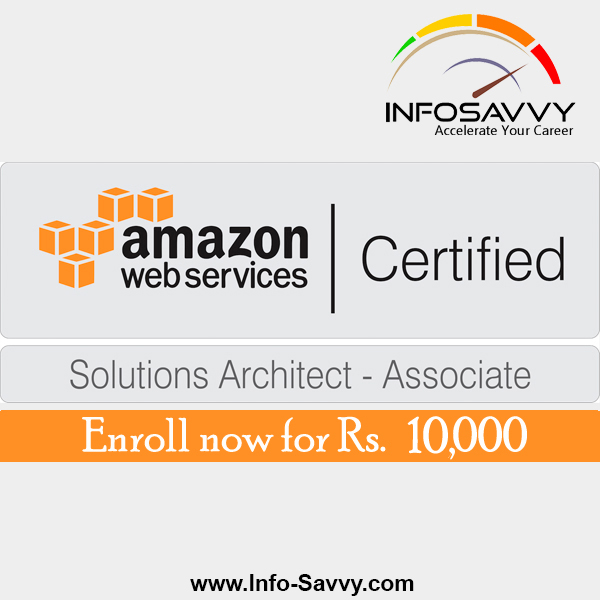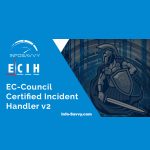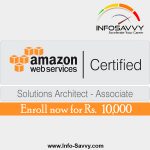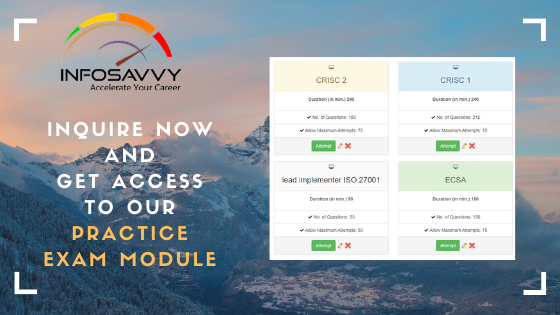AWS Certified Solutions Architect | Associate examination is intended for individuals who perform a solutions architect role. This exam validates an examinee’s ability to effectively demonstrate knowledge of how to architect and deploy secure and robust applications on AWS technologies.
It validates an examinee’s ability to:
- Define a solution using architectural design principles based on customer requirements.
- Provide implementation guidance based on best practices to the organization throughout the life cycle of the project
- Designing and deploying dynamically scalable, highly available, fault tolerant, and reliable applications on AWS
- Selecting appropriate AWS services to design and deploy an application based on given requirements
- Migrating complex, multi-tier applications on AWS
- Designing and deploying enterprise-wide scalable operations on AWS
- Implementing cost control strategy
Amazon Web Services Introduction
- What is Amazon Web Services ?
- Why Amazon Web Services ?
- Amazon Web Services Concepts
- Amazon Web Services Essentials
AWS Organization
- AWS Account & Physical Organization
- Exploring the AWS Account and Services Layer
- Exploring the AWS Physical and Networking Layer
- Essential CSA Terminology
Access Management
- IAM (Identity & Access Management)
- IAM Essentials
- IAM Policies
- IAM Users
- IAM Groups
- IAM Roles
- IAM API Keys
AWS Interfaces (The AWS Console)
- Interacting with AWS
- Console Tour and Navigation: Settings and
- Account Management
Introduction to Networking
- Introduction to AWS VPC Networking
- VPC Essentials
- VPC Network Routing Basics
- VPC Security Basics
Server Based Compute Services
- EC2 (Elastic Compute Cloud)
- EC2 Essentials
- EC2 Purchasing Options
- EC2 AMIs and Virtualization
- EC2 Instance Types
- Public, Private, and Elastic IP Addresses
- EC2 Bootstrapping, User-Data, and Meta-Data
- EC2 Storage Options
- Security Groups
- Key-Pair and Connecting to an EC2 via SSH
- EC2 and Networking (Recap)
- EBS Snapshots
- EC2 Placement Groups
- ECS
- ECS Essentials
- EKS
- EKS Essentials
Server LESS Based Compute Services
Quick Detour
- What you need to know before moving on
- Introduction to Cloud Watch, Cloud Trail, and SNS
Advanced Networking
- Highly Available & Fault Tolerant VPC Networking
- Auto Scaling and Elastic Load Balancing Essentials
- Advanced VPC Networking for Increased Security
- Serving Traffic to and from Private Web Servers
- Network Connectivity Troubleshooting
- EC2 Troubleshooting Scenarios
- ELB Troubleshooting Scenarios
- Auto Scaling Troubleshooting Scenarios
Storage Services
- S3 (Simple Storage Service)
- S3 Essentials
- S3 Permissions
- S3 Storage Classes
- Object Versioning
- S3 Lifecycle Policies
- S3 Events
- Website Hosting with S3
- Getting Data Into and Out of S3
Hybrid Enviornments
- Advanced DNS, CDN, and Failover Networking
- Route 53
- Route 53 DNS Failover
- Cloud Front Essentials
- Performance Considerations with Cloud Front
- Hybrid Environments & VPC Peering
- Virtual Private Network (VPN)
- AWS Direct Connect
- AWS Storage Gateway
- VPC Peering
AWS Interfaces (The AWS CLI)
- Interacting with AWS
- Install and Configure the AWS CLI
Database Services
- RDS (Relational Database Service)
- RDS Essentials
- DynamoDB
- DynamoDB Essentials
- ElastiCache
- ElastiCache Essentials
- Redshift
- RedShift Essentials
Monitoring
- CloudWatch
- CloudWatch Essentials
- CloudTrail
- CloudTrail Essentials
Application & Messaging Services
- SNS (Simple Notification Service)
- SNS Essentials
- SQS (Simple Queue Service)
- SQS Essentials
- Using SQS to Build Decoupled ApplicationArchitectures
- SWF (Simple Work Flow)
- SWF Essentials
Deployment Services
- CloudFormation
- CloudFormation Essentials
- Elastic Beanstalk
- Elastic Beanstalk Essentials
- Opsworks
- Opsworks Essentials
Analytics
- Kinesis
- Kinesis Essentials
- Kinesis Workflow, Producers, and Consumers
- EMR
- EMR Essentials
Certified Solution Architect Concepts
- Implementation & Deployment
- How to Design Cloud Services and BestPractices
- Monitoring Your AWS Environment
- Architectural Trade-Off Decisions
- Elasticity and Scalability
- Security Architecture with AWS
- Shared Security Responsibility Model and Attributes
- AWS Platform Compliance and Security Services
- Incorporating Common Conventional Security Products
- DDoS Mitigation
- Encryption Solution
- Complex Access Controls
- Amazon CloudWatch for the Security Architect
- CloudHSM
- Disaster Recovery
- Disaster Recovery
AWS Certified Solutions Architect | Associate
Becoming an AWS Certified Solutions Architect | Associate, you’re demonstrating that you possess the skills and technical knowledge necessary for designing, deploying, and operating applications and infrastructure on AWS. The AWS certification exam related validates advanced technical skills and experience in designing distributed applications and systems on the AWS platform.
The AWS Certified Solutions Architect – Associate examination is intended for individuals who perform a solutions architect role. This exam validates an examinee’s ability to effectively demonstrate knowledge of how to architect and deploy secure and robust applications on AWS technologies.
AWS Certified Solutions Architect | Associate validates and examines ability to:
- Define a solution using architectural design principles based on customer requirements.
- Provide implementation guidance based on best practices to the organization throughout the life cycle of the project
- Designing and deploying dynamically scalable, highly available, fault tolerant, and reliable applications on AWS
- Selecting appropriate AWS services to design and deploy an application based on given requirements
- Migrating complex, multi-tier applications on AWS
- Designing and deploying enterprise-wide scalable operations on AWS
- Implementing cost control strategy
Amazon Web Services Introduction
- What is Amazon Web Services ?
- Why Amazon Web Services ?
- Amazon Web Services Concepts
- Amazon Web Services Essentials
AWS Organization
- AWS Account & Physical Organization
- Exploring the AWS Account and Services Layer
- Exploring the AWS Physical and Networking Layer
- Essential CSA Terminology
Access Management
- IAM (Identity & Access Management)
- IAM Essentials
- IAM Policies
- IAM Users
- IAM Groups
- IAM Roles
- IAM API Keys
AWS Interfaces (The AWS Console)
- Interacting with AWS
- Console Tour and Navigation: Settings and
- Account Management
Introduction to Networking
- Introduction to AWS VPC Networking
- VPC Essentials
- VPC Network Routing Basics
- VPC Security Basics
Server Based Compute Services
- EC2 (Elastic Compute Cloud)
- EC2 Essentials
- EC2 Purchasing Options
- EC2 AMIs and Virtualization
- EC2 Instance Types
- Public, Private, and Elastic IP Addresses
- EC2 Bootstrapping, User-Data, and Meta-Data
- EC2 Storage Options
- Security Groups
- Key-Pair and Connecting to an EC2 via SSH
- EC2 and Networking (Recap)
- EBS Snapshots
- EC2 Placement Groups
- ECS
- ECS Essentials
- EKS
- EKS Essentials
Server LESS Based Compute Services
Quick Detour
- What you need to know before moving on
- Introduction to Cloud Watch, Cloud Trail, and SNS
Advanced Networking
- Highly Available & Fault Tolerant VPC Networking
- Auto Scaling and Elastic Load Balancing Essentials
- Advanced VPC Networking for Increased Security
- Serving Traffic to and from Private Web Servers
- Network Connectivity Troubleshooting
- EC2 Troubleshooting Scenarios
- ELB Troubleshooting Scenarios
- Auto Scaling Troubleshooting Scenarios
Storage Services
- S3 (Simple Storage Service)
- S3 Essentials
- S3 Permissions
- S3 Storage Classes
- Object Versioning
- S3 Lifecycle Policies
- S3 Events
- Website Hosting with S3
- Getting Data Into and Out of S3
Hybrid Enviornments
- Advanced DNS, CDN, and Failover Networking
- Route 53
- Route 53 DNS Failover
- Cloud Front Essentials
- Performance Considerations with Cloud Front
- Hybrid Environments & VPC Peering
- Virtual Private Network (VPN)
- AWS Direct Connect
- AWS Storage Gateway
- VPC Peering
AWS Interfaces (The AWS CLI)
- Interacting with AWS
- Install and Configure the AWS CLI
Database Services
- RDS (Relational Database Service)
- RDS Essentials
- DynamoDB
- DynamoDB Essentials
- ElastiCache
- ElastiCache Essentials
- Redshift
- RedShift Essentials
Monitoring
- CloudWatch
- CloudWatch Essentials
- CloudTrail
- CloudTrail Essentials
Application & Messaging Services
- SNS (Simple Notification Service)
- SNS Essentials
- SQS (Simple Queue Service)
- SQS Essentials
- Using SQS to Build Decoupled ApplicationArchitectures
- SWF (Simple Work Flow)
- SWF Essentials
Deployment Services
- CloudFormation
- CloudFormation Essentials
- Elastic Beanstalk
- Elastic Beanstalk Essentials
- Opsworks
- Opsworks Essentials
Analytics
- Kinesis
- Kinesis Essentials
- Kinesis Workflow, Producers, and Consumers
- EMR
- EMR Essentials
Certified Solution Architect Concepts
- Implementation & Deployment
- How to Design Cloud Services and BestPractices
- Monitoring Your AWS Environment
- Architectural Trade-Off Decisions
- Elasticity and Scalability
- Security Architecture with AWS
- Shared Security Responsibility Model and Attributes
- AWS Platform Compliance and Security Services
- Incorporating Common Conventional Security Products
- DDoS Mitigation
- Encryption Solution
- Complex Access Controls
- Amazon CloudWatch for the Security Architect
- CloudHSM
- Disaster Recovery
- Disaster Recovery
- Engages with customers to understand their business drivers, assess application portfolios, design reliable and cost-effective cloud native architectures
- Forms partnerships with customers, sales and other teams to create highly scalable, flexible and resilient cloud architectures that address customer business problems
- Accelerates the adoption of AWS services and will assist in driving revenue growth across a broad set of customers
- Helps organizations understand best practices around advanced cloud-based solutions, and how to migrate existing workloads to the cloud
- Is self-motivated with a proven track record in software/technology sales or consulting
- Educates about the value proposition of AWS, and participate in deep architectural discussions
- Thinks strategically about business, products, and technical challenges
- Designing and deploying dynamically scalable, highly available, fault tolerant, and reliable applications on AWS
- Selecting appropriate AWS services to design and deploy an application based on given requirements
- Migrating complex, multi-tier applications on AWS
- Designing and deploying enterprise-wide scalable operations on AWS
- Implementing cost control strategies
- IT Managers
- IT Staff and process owners
- IT Developers
- Project and Business Managers directly involved in IT
- Implementing & operating IT services in-house or for external customers
- Application development/maintenance
- IT Consultants
- Quality Assurance Professionals
- IT Auditors
- IT Service Management Professionals
- Any member of an IT Organization in delivery of IT services.
- Fresher’s looking for opportunity in Cloud Computing
- Security Officers
- Auditors
- Network Administrators
- Firewall Administrators
- Security Professionals
- Anyone who is concerned about the integrity of the network infrastructure
- Network Administrator
- Systems Administrator
- Systems Engineer
- Systems Architect
- Network Security Specialist
Other Technology Certifications











Reviews
There are no reviews yet.